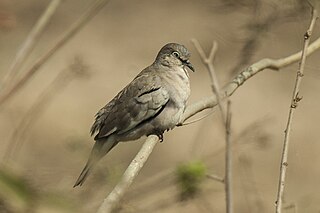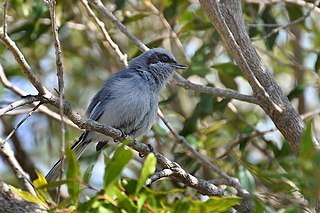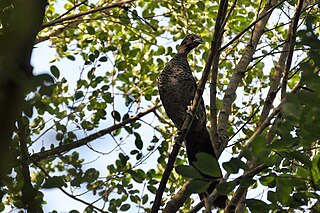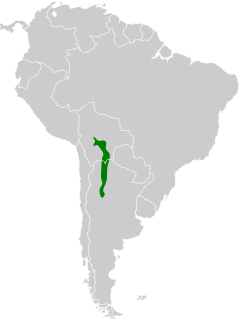
The grey-headed chachalaca is a member of an ancient group of birds of the family Cracidae, which includes chachalacas, guans, and curassows. It is found from Honduras to Colombia.

The little chachalaca is a bird in the family Cracidae, the chachalacas, guans, and curassows. It is found in Brazil, French Guiana, Suriname, Guyana, Venezuela and possibly Colombia.

The plain chachalaca is a large bird in the chachalaca, guan and curassow family Cracidae. It breeds in tropical and subtropical environments from mezquital thickets in the Rio Grande Valley in southernmost Texas, United States to northernmost Costa Rica. In Central America, this species occurs in the Pacific lowlands from Chiapas, Mexico to northern Nicaragua and as a separate population in Costa Rica, where its range is separated by a short distance, as a disjunct population.

The Chaco owl is an owl found in Argentina, Bolivia, and Paraguay.

The speckled chachalaca is a species of bird in the family Cracidae, the chachalacas, guans, and curassows. It is found in Bolivia, Brazil, Colombia, Ecuador, and Peru.

The white-bellied chachalaca is a species of bird in the family Cracidae, the chachalacas, guans, and curassows. It is found in El Salvador, Guatemala, Honduras, Mexico, and Nicaragua.

The buff-browed chachalaca is a species of bird in the family Cracidae, the chachalacas, guans, and curassows. It is endemic to Brazil.

The rufous-bellied chachalaca is a species of bird in the family Cracidae, the chachalacas, guans, and curassows. It is endemic to western Mexico.

The red-faced guan is a species of bird in the family Cracidae, the chachalacas, guans, and curassows. It is found in Argentina and Bolivia.

The rusty-margined guan is a species of bird in the family Cracidae, which includes the chachalacas, guans, and curassows. It is found in Argentina, Bolivia, Brazil, and Paraguay.

The Picui ground dove or Picui dove is a species of bird in the family Columbidae. It is found in Argentina, Bolivia, Brazil, Chile, Colombia, Paraguay, Peru, and Uruguay.

The plumbeous pigeon is a species of bird in the family Columbidae. It is found in Bolivia, Brazil, Colombia, Ecuador, French Guiana, Guyana, Panama, Paraguay, Peru, Suriname, and Venezuela.

The Chaco sparrow, formerly known as the stripe-capped sparrow, is a species of bird in the family Passerellidae. It is found in Argentina and Paraguay.

The saffron-billed sparrow is a species of bird in the family Passerellidae, the New World sparrows. It is found in Argentina, Bolivia, Brazil, and Paraguay.

The olive-crowned crescentchest is a species of bird in the family Melanopareiidae. It is found in Argentina, Bolivia, and Paraguay.

The masked gnatcatcher is a small songbird in the family Polioptilidae. It is found in Argentina, Bolivia, Brazil, Paraguay, and Uruguay.

The East Brazilian chachalaca is a species of bird in the family Cracidae, the chachalacas, guans, and curassows. It is endemic to eastern Brazil.

The scaled chachalaca is a species of bird in the family Cracidae, the chachalacas, guans, and curassows. It is endemic to Brazil.

The chestnut-headed chachalaca is a bird in the family Cracidae, the chachalacas, guans, and curassows. It is endemic to Brazil.

The Yungas guan is a species of bird in the family Cracidae, the chachalacas, guans, and curassows. It is found in the Andean foothills of Argentina and Bolivia.
























